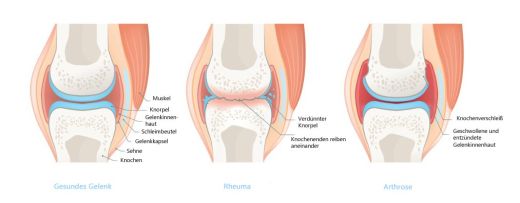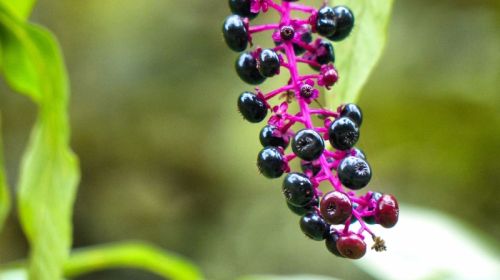Osteoarthritis and rheumatism cause severe joint pain and discomfort in the musculoskeletal system. Homeopathic medicines can relieve pain, improve joint inflammation, and support other treatments for rheumatism and osteoarthritis.
Rheumatism summarizes various complaints that affect the musculoskeletal system. It is an autoimmune disease that attacks your own body. The consequences are inflammation that affects bones, connective tissue, muscles and joints.
Article content at a glance:
How do osteoarthritis and rheumatism differ?
The most common form of rheumatism, rheumatic arthritis (rheumatoid arthritis) causes pain, swelling, redness and restricted movement. It is estimated that around 800,000 people are currently ill in Germany. Small joints are particularly affected, the symptoms usually appear on both sides of the body at the same time. The inflammation destroys the joints over time and limits their mobility.
-
Healthy joint and for rheumatism and arthrosis
© iStock.com/elenabs, Lifeline
Osteoarthritis is the most common joint disease in adults. The articular cartilage slowly degrades. As the osteoarthritis progresses, adjacent structures such as bones, muscles, joint capsules and ligaments can be affected. A joint that has been altered by osteoarthritis causes pain and restricted movement and function. This leads to severe restrictions in everyday life and a considerable loss of quality of life. Osteoarthritis of the knee (gonarthrosis), hip joints (coxarthrosis) and shoulder joints (omarthrosis) is particularly common.
How can homeopathy help with osteoarthritis and rheumatism?
Accompanying homeopathic treatment of joint pain can be carried out for acute and chronic complaints. In particular, the relief of pain and the slowing down of disease progression are goals of homeopathic therapy. It is used as a supplement to other treatments for rheumatism and arthrosis. This can sometimes reduce the amount of painkillers and anti-inflammatory drugs.
Homeopathic remedies and complex remedies are used for rheumatism and arthrosis. These are used as tablets, globules, drops, ointments or injections. Treatment should be carried out by a homeopath after a detailed medical history. Homeopathic self-treatment is particularly suitable when the symptoms in the area of the musculoskeletal system are to be significantly alleviated.
Homeopathic remedies for the treatment of joint problems
The following homeopathic remedies have proven themselves in the treatment of joint complaints such as rheumatism and arthrosis:
Apis mellifica
- Apis mainly acts on the inner skin of the joint
- for stinging pain
- rapid onset of joint inflammation with edema and joint effusion
Arnica
- Pain like sore and battered
- Numbness
- Swelling of the affected joint
Belladonna
- swollen, red, hot and shiny joints
- very sensitive to touch or slightest vibration
Bryonia
- acute swelling and feeling of tension
- sharp pain
- especially when the inner skin of the joint is involved
Cimicifuga
- cramping pain or shooting like electric shock
- Limb restlessness and twitching
Colchicum
- severe joint pain
- Periosteum and inner synovium affected
- Redness, heat, and swelling of the affected joints
Dulcamara: with a stiff neck and back pain
Ferrum phosphoricum
- when complaints are developing
- acute, pulling pain
- Joints swollen but not red or swollen and very sensitive
Ledum
- Complaints start in the feet and move upwards
- Joints sensitive to the slightest vibration
Lycopodium
- Weakness and exhaustion in the extremities
- burning pain between the shoulder blades
- Cramps in the calves and toes
Phytolacca
- Complaints drag on
- excruciating pain
Pulsatilla
- Pain moves from one place to another, the severity of the symptoms changes very often
- Redness and swelling of the joints
- drawing, tearing pain
Rhus toxicodendron
- drawing, tearing pain
- particularly large joints affected
Silicea
- for hip and knee pain: pronounced weakness of the legs with the least effort
- bruising, shooting and stinging pain
- Pain in the knees
- Leg cramps while sitting
Sulfur
- tearing pain in muscles and joints
- pulling pain from top to bottom
- Swelling of the joints
Complex remedy for rheumatism and arthrosis
Homeopathic complex remedies are also suitable for the treatment of joint pain. They combine various active ingredients against rheumatism and arthrosis complaints. They are offered as tablets, drops, ointments or as a solution for envelopes.
How are homeopathic medicines taken?
Homeopathic single remedies are used in potencies D6 and D12 in acute cases. The most common are globules, drops and tablets. A dose consists of three globules, three drops or a tablet, which melt under the tongue. In acute cases, this dose can be taken every hour. However, a drug in potency D6 should not be used more than ten times and potency D12 no more than six times a day. Repeat the intake until the symptoms improve significantly.
Rheumatism and arthrosis: what else can you do?
There are some simple tips for people suffering from rheumatism or osteoarthritis. In this way, they can help them to live better with their illness and to avoid or delay surgical treatments if possible.
The German Rheumatism League recommends a simple principle: Live healthy! This can be transferred to osteoarthritis. In addition to an appropriate body weight, regular exercise is considered to be particularly important. Special rheumatism or arthrosis gymnastics, functional training and physiotherapy should help to strengthen muscles and keep the joints flexible. Joint-friendly sports such as swimming and cycling can also be helpful.
Diet can also help to improve or at least not make joint complaints worse. A "joint-friendly" diet should be low in purine and arachidonic acid, since both substances are involved in the development of inflammatory processes in the body. Fat sausages, offal, lard, egg yolk, certain types of fish such as sardines, herring, tuna and trout should disappear from the menu or be significantly reduced. Alcohol should also be avoided. The consumption of milk products, nuts, fruits, vegetables and potatoes is advised against this.


